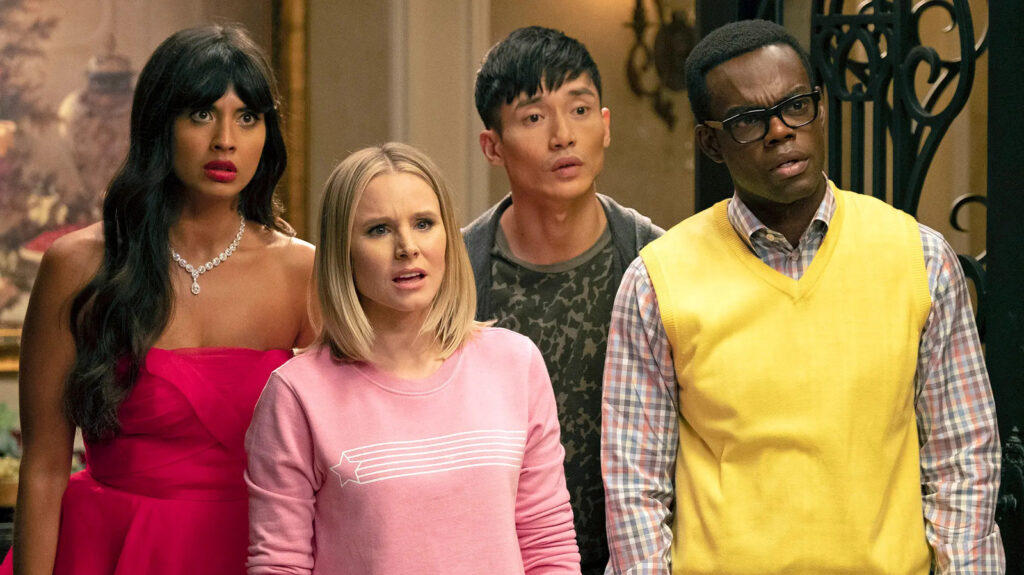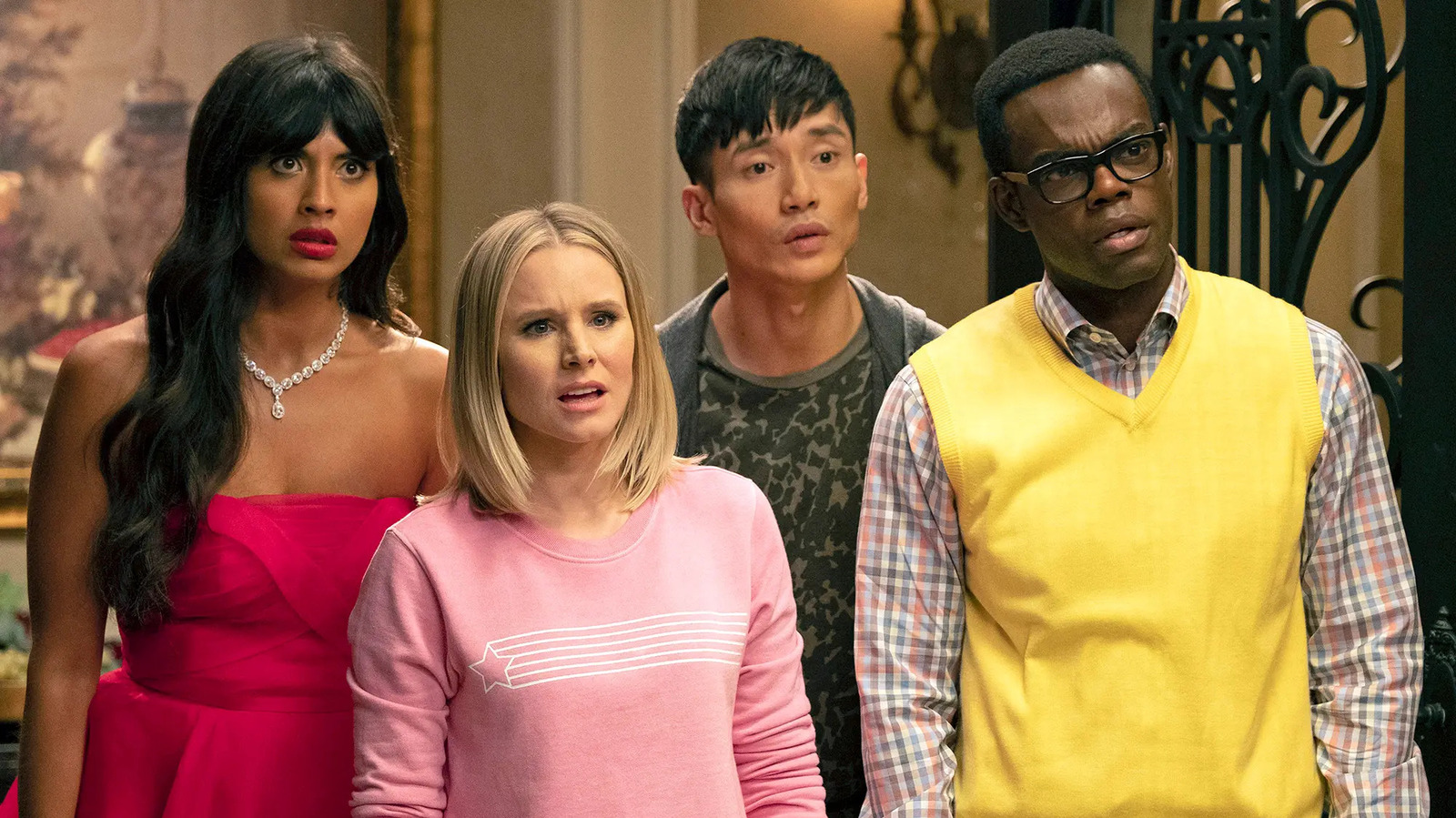
Why ‘The Good Place’ is a Timeless TV Show: Exploring its Enduring Appeal
In the vast landscape of television, where shows come and go with alarming speed, some series manage to carve out a special place in the hearts of viewers. ‘The Good Place,’ a comedy-fantasy created by Michael Schur, is undoubtedly one of those shows. Airing for four seasons from 2016 to 2020, it captivated audiences with its unique blend of humor, philosophy, and heartwarming character development. This article delves into the reasons why ‘The Good Place’ remains a timeless TV show, exploring its innovative premise, sharp writing, and the profound questions it poses about morality and the human condition.
A Refreshing and Original Premise
One of the key factors that set ‘The Good Place’ apart from other sitcoms is its incredibly original premise. The show centers around Eleanor Shellstrop (Kristen Bell), a morally questionable woman who finds herself in the afterlife, specifically ‘The Good Place,’ a utopian paradise designed for those who lived virtuous lives. The catch? Eleanor knows she doesn’t belong there. This sets the stage for a hilarious and thought-provoking journey as Eleanor tries to hide her true nature while grappling with the moral implications of her past actions.
The show’s concept is not only inventive but also provides a fertile ground for exploring complex philosophical ideas in an accessible and entertaining way. Unlike many sitcoms that rely on predictable tropes and formulaic plots, ‘The Good Place’ constantly surprises viewers with unexpected twists and turns, keeping them engaged and invested in the characters’ fates. The exploration of afterlife and moral philosophy through the lens of comedy is what makes ‘The Good Place’ a standout TV show.
Sharp Writing and Clever Humor
The writing in ‘The Good Place’ is consistently sharp, witty, and intelligent. The show’s humor is not just about cheap laughs; it’s often rooted in character interactions, situational irony, and clever wordplay. The writers masterfully balance lighthearted comedy with more profound moments, creating a viewing experience that is both entertaining and emotionally resonant. The dialogue is crisp, the jokes are well-timed, and the characters’ voices are distinct and believable.
Furthermore, ‘The Good Place’ seamlessly integrates philosophical concepts into its narrative without ever feeling preachy or didactic. The show tackles complex ideas about ethics, morality, and the meaning of life in a way that is both accessible and engaging, making viewers think without sacrificing entertainment value. The show’s writers clearly did their homework, drawing inspiration from a wide range of philosophical traditions, from Aristotle to Kant, and incorporating these ideas into the storylines organically. This makes ‘The Good Place’ a truly unique and intellectually stimulating TV show.
Compelling Character Development
At the heart of ‘The Good Place’ are its well-developed and relatable characters. Eleanor, Chidi Anagonye (William Jackson Harper), Tahani Al-Jamil (Jameela Jamil), and Jason Mendoza (Manny Jacinto) are all flawed individuals who embark on a journey of self-discovery and moral improvement. Their interactions are often hilarious, but they also reveal deeper truths about human nature and the challenges of living a virtuous life.
One of the show’s greatest strengths is its ability to portray character growth in a realistic and nuanced way. The characters don’t magically transform into perfect beings overnight; they struggle with their weaknesses, make mistakes, and learn from their experiences. This makes them feel more human and relatable, allowing viewers to connect with them on a deeper level. The evolution of Eleanor from a self-centered con artist to a genuinely good person is particularly compelling, and her relationship with Chidi, a moral philosophy professor, is one of the show’s most heartwarming aspects. ‘The Good Place’ demonstrates that even the most flawed individuals are capable of change and that personal growth is a lifelong process.
Exploring Moral Philosophy in an Accessible Way
‘The Good Place’ is not just a comedy; it’s also a philosophical exploration of morality and ethics. The show grapples with fundamental questions about what it means to be a good person, what constitutes a virtuous life, and whether it’s possible to achieve moral perfection. It introduces viewers to various ethical frameworks, such as utilitarianism, deontology, and virtue ethics, and invites them to consider these concepts in the context of the characters’ experiences.
By presenting these complex philosophical ideas in an accessible and entertaining way, ‘The Good Place’ makes them relevant to everyday life. The show encourages viewers to think critically about their own values and beliefs and to consider the consequences of their actions. It challenges the notion that morality is a fixed and immutable concept and suggests that it’s something that we must constantly strive to improve. The series successfully uses humor and relatable characters to make complex philosophical ideas digestible, further solidifying its place as a unique TV show.
A Satisfying and Thought-Provoking Ending
Many TV shows struggle to deliver a satisfying ending, but ‘The Good Place’ managed to stick the landing with a conclusion that was both emotionally resonant and intellectually stimulating. The series finale provided closure for the characters while also leaving viewers with plenty to ponder about the nature of existence and the meaning of life.
The ending of ‘The Good Place’ is bittersweet, acknowledging the impermanence of life while also celebrating the beauty and value of human connection. It suggests that the ultimate goal is not to achieve perfection but to continually strive to become better versions of ourselves and to make the world a better place for others. The show’s message is ultimately one of hope and optimism, reminding us that even in the face of adversity, we have the power to choose kindness, compassion, and empathy. The ending is a testament to the show’s overall quality, offering a thoughtful conclusion to a truly exceptional TV show.
The Enduring Legacy of ‘The Good Place’
Even years after its conclusion, ‘The Good Place’ continues to resonate with viewers and critics alike. Its unique blend of humor, philosophy, and heartwarming character development has made it a beloved and enduring TV show. The show’s exploration of morality and ethics is particularly relevant in today’s world, where issues of social justice, environmental responsibility, and political polarization are at the forefront of public discourse.
‘The Good Place’ reminds us that we all have a responsibility to make the world a better place and that even small acts of kindness can have a significant impact. It challenges us to think critically about our own values and beliefs and to strive to live a more virtuous life. The show’s message of hope and optimism is particularly powerful in a world that often feels cynical and divided. [See also: Best Comedy TV Shows of the 21st Century] Its enduring appeal lies in its ability to entertain, educate, and inspire viewers to be better human beings. Ultimately, ‘The Good Place’ is more than just a TV show; it’s a reminder of what it means to be human and a call to action to create a more just and compassionate world. The series has solidified its spot as a modern classic and a truly unforgettable TV show.
The Good Place: A Cultural Phenomenon
Beyond its critical acclaim and devoted fanbase, ‘The Good Place’ has also had a significant impact on popular culture. The show’s catchphrases, such as “What the fork?” and “Ya basic,” have become widely used in everyday conversation. The show’s characters have inspired countless memes and fan art. And its philosophical themes have been the subject of numerous articles, essays, and academic papers.
The show’s success has also paved the way for other comedies that tackle complex issues in an accessible and entertaining way. ‘The Good Place’ has demonstrated that it’s possible to create a TV show that is both smart and funny, thought-provoking and heartwarming. Its influence can be seen in a variety of other series, from ‘Ted Lasso’ to ‘After Life,’ all of which explore themes of morality, redemption, and the meaning of life. The legacy of ‘The Good Place’ extends far beyond the realm of television, influencing the way we think about ethics, morality, and the human condition. It is a truly exceptional TV show that will continue to resonate with audiences for years to come.
Conclusion
‘The Good Place’ is a timeless TV show for many reasons. Its original premise, sharp writing, compelling characters, and exploration of moral philosophy have all contributed to its enduring appeal. The show is not just a comedy; it’s also a thought-provoking exploration of what it means to be human. It reminds us that we all have the potential to be better and that even the smallest acts of kindness can make a difference. If you haven’t already seen ‘The Good Place’, I highly recommend you give it a watch. You might just find yourself pondering the meaning of life – and laughing along the way. It’s a truly special TV show that deserves all the praise it has received.

